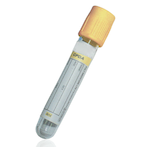Total Protein (serum)
Specimen Volume
1 mLSample Preparation
Centrifuge
Turnaround Time
24 hoursSample Processing In Laboratory
Usual
Sample Stability
Stable for 1 month at 2°C to 8°C. 6 months at -15°C to -25°C.
General Information
Total protein measurements are used in a variety of clinical situations. It may be used in combination with albumin measurements to identify a range of disorders. In the clinical states which follow, the diseases listed are total protein may be increased or decreased as indicated, but not in all patients presenting with the disorders. Causes of high total protein: dehydration; some cases of chronic liver disease, including chronic active hepatitis and cirrhosis; neoplasms, especially myeloma; macroglobulinemia of Waldenström; tropical diseases (eg, kala-azar, leprosy, and others); granulomatous diseases, such as sarcoidosis; diseases in which total protein is sometimes high include collagen disease (eg, lupus erythematosus (SLE), and other instances of chronic infection/inflammation). Causes of low total protein: pregnancy; intravenous fluids; cirrhosis or other liver disease, including chronic alcoholism; prolonged immobilization; heart failure; nephrotic syndromes; glomerulonephritis; neoplasia; protein losing enteropathies; Crohn disease and chronic ulcerative colitis; starvation, malabsorption or malnutrition; hyperthyroidism; burns; severe skin disease; and other chronic diseases. Very low total protein (<40 g/L) and low albumin cause oedema (eg, the nephrotic syndromes).
Patient Preparation
None
Notes
No Interference from haemolysis, lipaemia or high bilirubin concentration.
Reference Range
Adult male/female reference range: 60-80 g/L
(Pathology Harmony)
Specifications
-
EQA Status:
NEQAS
- EQAS Scheme: Yes








